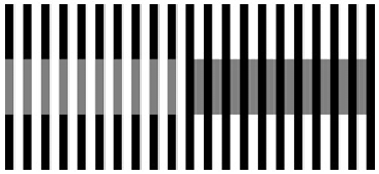Java Reference
In-Depth Information
< Day Day Up >
Puzzle 87: Strained Relations
In mathematics, the equals sign (=) defines an
equivalence relation
on the real numbers. An
equivalence relation partitions a set into
equivalence classes
, each consisting of all the values that
are equivalent to one another. Other equivalence relations include "is congruent to" on the set of all
triangles and "has the same number of pages as" on the set of all topics. Formally, a relation ~ is an
equivalence relation if and only if it is
reflexive
,
transitive
, and
symmetric
. These properties are
defined as follows:
Reflexive:
x
~
x
for all
x
. In other words, every value is related to itself.
Transitive: if
x
~
y
and
y
~
z
, then
x
~
z
. In other words, if one value is related to a second and
the second is related to a third, the first value is related to the third.
Symmetric: if
x
~
y
, then
y
~
x
. In other words, if one value is related to a second, the second
value is related to the first.
But this isn't a book about set theory; it's a book about Java. In Java, does the
==
operator define an
equivalence relation over the primitive values? If not, which of the three properties does it violate?
Provide code snippets to demonstrate any violations.
Solution 87: Strained Relations
If you did
Puzzle 29
, you know that the
==
operator is not reflexive, because the expression
(Double.NaN == Double.NaN)
evaluates to
false
, as does the expression
(Float.NaN ==
Float.NaN)
. But does the
==
operator violate symmetry or transitivity? It turns out that it does not
violate symmetry:
(x == y)
implies that
(y == x)
for all values
x
and
y
. transitivity is another
matter entirely.
Puzzle 35
provides a clue as to why the
==
operator is not transitive over the primitive values. When
comparing two numeric primitive values, the
==
operator first performs
binary numeric promotion
[JLS 5.6.2]. This may result in a
widening primitive conversion
on one of the two values [JLS
5.1.2]. Most widening primitive conversions are harmless, with three notable exceptions:
Converting an int or a long value to float, or a long value to double can result in loss of
precision.
This loss of precision can manifest itself as nontransitivity of the
==
operator.
The trick to achieving this nontransitivity is to lose precision in two of the three value comparisons,














Search WWH ::

Custom Search